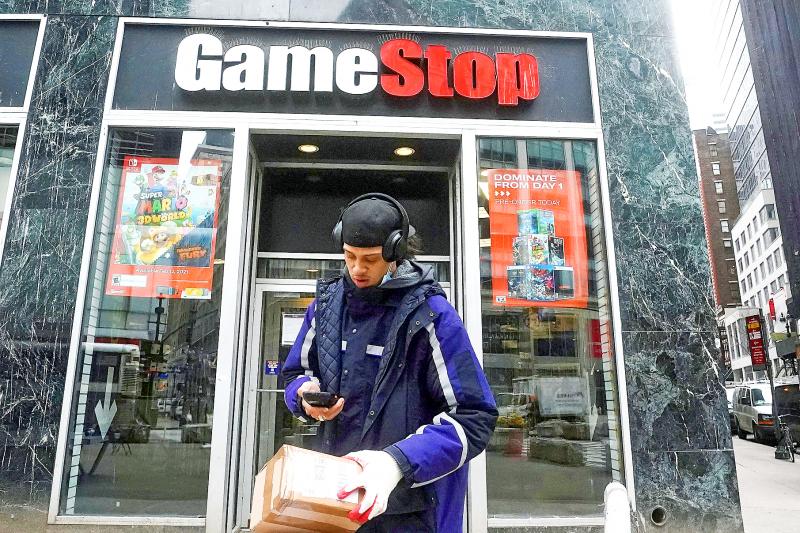GameStop Corp shares surged anew after chief financial officer (CFO) Jim Bell was pushed out in a disagreement over strategy, a move investors took as a sign that the video game retailer is on the comeback trail.
Media on Tuesday reported that Bell was ousted to make way for an executive more in line with the vision of activist investor and board member Ryan Cohen.
Insider on Wednesday also reported on the split, and investors on the Reddit discussion Web site seized on the news, helping send the shares up 104 percent to US$91.71 at the close. They went on to climb as much as 118 percent in extended trading.

Photo: Reuters
Cohen has been pushing to transform GameStop from a brick-and-mortar retailer into an e-commerce company, and he has been consolidating power at the chain. The former head of pet-supply Web site Chewy.com won three seats on GameStop’s board earlier this year.
An executive search firm has been engaged to find a finance chief with “the capabilities and qualifications to help accelerate GameStop’s transformation,” the company said on Tuesday.
Bell did not respond to a request for comment.
Trading in the video game retailer spiked over the final hour of trading, with almost 30 million shares changing hands in the last 60 minutes of the session. That marked the most active day since Feb. 5.
Other day-trader favorites, including AMC Entertainment Holdings Inc, headphone maker Koss Corp and retailer Express Inc, spiked as Redditors shared their excitement for a group that has had a roller coaster of a year.
The Grapevine, Texas-based video game retailer is undertaking a strategic review, largely the result of pressure from Cohen, who bought about 13 percent of its stock and became the company’s largest individual investor.
The activist has pushed GameStop to become a more direct competitor to Amazon.com Inc.
GameStop chief accounting officer Diana Jajeh would step in if Bell’s former post is not filled by March 26, the retailer said.
Bell has held the position since June 2019.
“Bell’s resignation was not because of any disagreement with the company on any matter relating to the company’s operations, policies or practices, including accounting principles and practices,” the company said in a filing.
Shares of GameStop had tumbled as much as 4.8 percent to US$42.80 on Tuesday in extended trading following the announcement. Shares of the company soared as high as US$483 in January during a so-called short squeeze.
GameStop was not able to capitalize on that, although the company in December last year had said that it might try to raise as much as US$100 million through a stock sale.
The frenzied stock action was driven by traders on Reddit.
The US Congress is holding a series of hearings to determine if the surge and subsequent collapse in GameStop shares exposed any holes in the US financial system.

South Korea’s equity benchmark yesterday crossed a new milestone just a month after surpassing the once-unthinkable 5,000 mark as surging global memory demand powers the country’s biggest chipmakers. The KOSPI advanced as much as 2.6 percent to a record 6,123, with Samsung Electronics Co and SK Hynix Inc each gaining more than 2 percent. With the benchmark now up 45 percent this year, South Korea’s stock market capitalization has also moved past France’s, following last month’s overtaking of Germany’s. Long overlooked by foreign funds, despite being undervalued, South Korean stocks have now emerged as clear winners in the global market. The so-called “artificial intelligence

‘SEISMIC SHIFT’: The researcher forecast there would be about 1.1 billion mobile shipments this year, down from 1.26 billion the prior year and erasing years of gains The global smartphone market is expected to contract 12.9 percent this year due to the unprecedented memorychip shortage, marking “a crisis like no other,” researcher International Data Corp (IDC) said. The new forecast, a dramatic revision down from earlier estimates, gives the latest accounting of the ongoing memory crunch that is affecting every corner of the electronics industry. The demand for advanced memory to power artificial intelligence (AI) tasks has drained global supply until well into next year and jeopardizes the business model of many smartphone makers. IDC forecast about 1.1 billion mobile shipments this year, down from 1.26 billion the prior

People stand in a Pokemon store in Tokyo on Thursday. One of the world highest-grossing franchises is celebrated its 30th anniversary yesterday.

Chinese artificial intelligence (AI) start-up DeepSeek’s (深度求索) latest AI model, set to be released as soon as next week, was trained on Nvidia Corp’s most advanced AI chip, the Blackwell, a senior official of US President Donald Trump’s administration said on Monday, in what could represent a violation of US export controls. The US believes DeepSeek will remove the technical indicators that might reveal its use of American AI chips, the official said, adding that the Blackwells are likely clustered at its data center in Inner Mongolia, an autonomous region of China. The person declined to say how the US government received